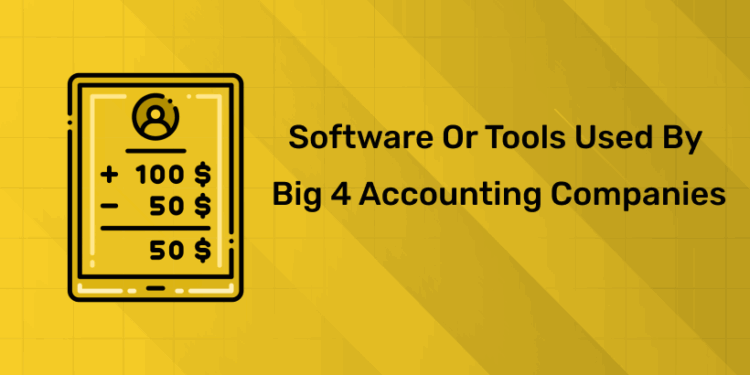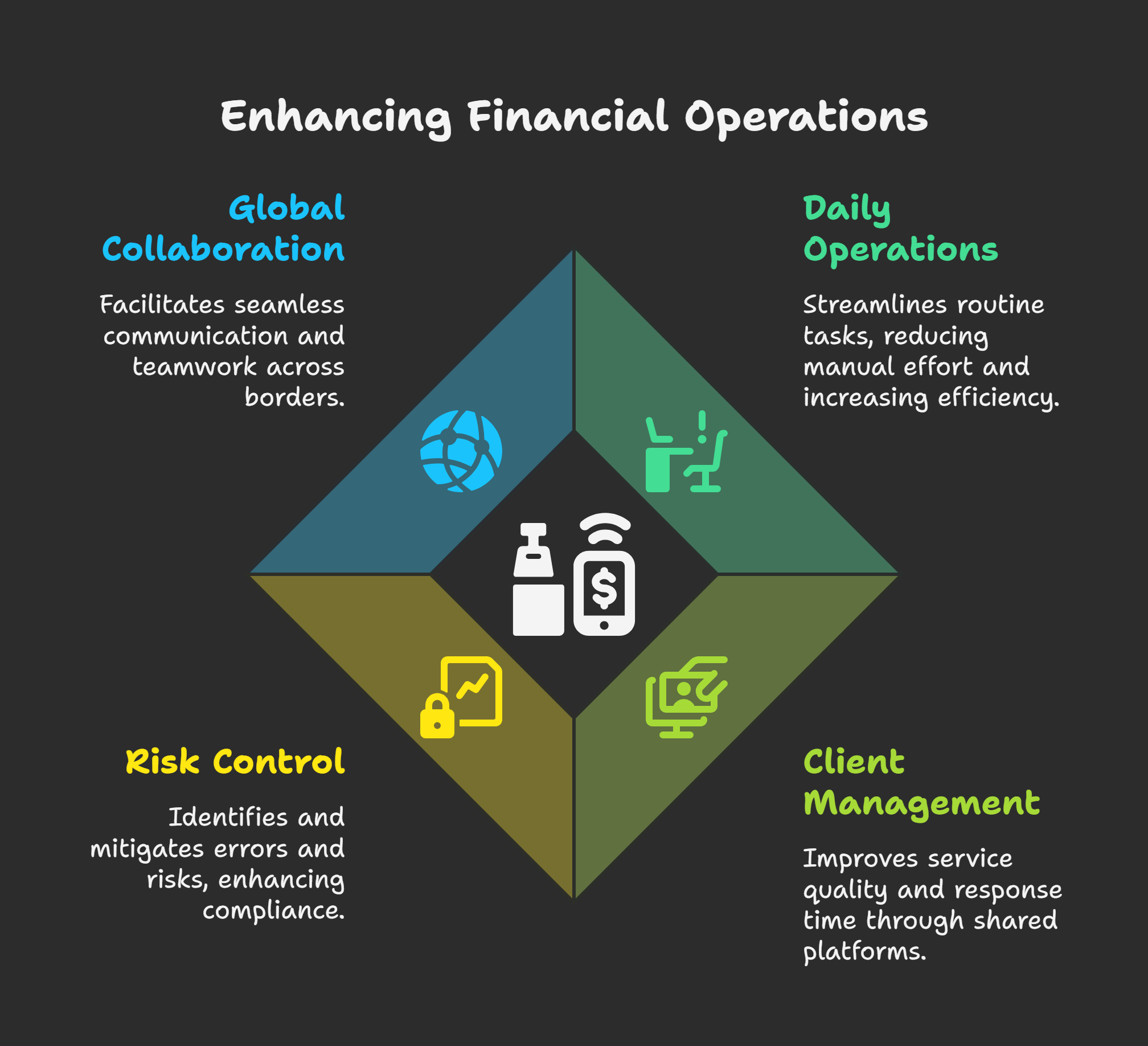Table of Contents
Big 4 accounting firms handle massive financial data daily. They rely on advanced tools to stay efficient. Software or Tools used by Big 4 accounting companies improves speed, accuracy, and compliance. These tools help them manage audits, taxes, and analytics. Without software, their work would take much longer. Technology ensures better results and fewer errors. That’s why they invest heavily in digital tools and platforms.
Each firm has its own tech stack and tools. However, many of the core systems are similar. Some tools are used for auditing and financial reporting. Others help in taxation, risk checks, and team collaboration. Data analysis also plays a major role today. These firms use business intelligence software to study trends. The goal is to deliver better services to clients. In the next sections, we’ll explore these tools in detail.
Become an Accounting Pro – Learn from Industry Experts!
Software or Tools used by Big 4 Accounting Companies: Introduction
The Big 4 accounting firms are global leaders in finance. They manage large amounts of data every single day. To do this well, they depend on smart tools. These tools help with audits, tax work, and data analysis. The right software saves time and avoids human mistakes. It also helps teams follow laws and work faster. Each firm uses a mix of popular and custom tools. Let’s look at why these tools are so important.
How Big 4 Firms Use Tools
1. Daily Operations
-
Tools support routine finance, tax, and audit work.
-
They reduce manual work and boost speed.
2. Client Management
-
Tools help track client needs and deliver solutions.
-
Shared platforms improve service quality and response time.
3. Risk Control
-
Tools spot errors and risks early.
-
They improve audit and compliance outcomes.
4. Global Collaboration
-
-
Teams across countries use the same platforms.
-
Tools ensure smooth communication and teamwork.
-
Why Tools & Tech Matter in Big 4 Firms
1: Accounting provides information on
Technology plays a big role in Big 4 accounting firms. These firms handle huge data, many clients, and tight deadlines. Tools help teams stay fast, accurate, and up to date. Without smart software, work would be slow and full of errors. Tools also support teamwork and help manage complex projects. From tax to audit, each area uses special software. Let’s explore why these tools really matter.
1. Speed and Efficiency
-
Tools help finish tasks much faster.
-
Repetitive jobs are done with automation.
-
Software speeds up tax filing and reports.
-
Deadlines are easier to meet with tools.
2. Accuracy and Compliance
-
Software reduces mistakes in numbers and data.
-
Built-in checks ensure rules are followed.
-
Tools help firms meet tax laws.
-
Less room for human error in reports.
3. Better Decision-Making
-
Tools give insights from large data sets.
-
Trends and risks are easy to spot.
-
Firms can advise clients with real facts.
-
Data-backed decisions help avoid business risks.
4. Smooth Collaboration
-
Cloud tools allow remote teamwork anytime.
-
Files and updates are shared in real-time.
-
Teams across countries can work together easily.
-
Tasks are tracked with simple dashboards.
5. Cost Savings
-
Automating work reduces need for manual staff.
-
Less errors mean fewer reworks or fines.
-
Saves money on time-consuming tasks.
-
Boosts profits by working smarter, not harder.
Summary Table – Why Tools Matter
| Area | How Tools Help |
|---|---|
| Speed | Faster reports and tax filings |
| Accuracy | Fewer errors in audits |
| Compliance | Meets laws and global rules |
| Insights | Detects trends and client risks |
| Teamwork | Easy sharing and remote access |
| Costs | Saves time and reduces rework |
Placement Oriented PWC Business Accounting Course
PWC Certified Business Accounting Course by Entri App: Master in-demand skills, ace interviews, and secure top-tier jobs.
Join Now!Software or Tools used by Big 4 Accounting Companies: Core Accounting & Audit Software
Big 4 firms handle large volumes of accounting and audit work. To manage this, they use powerful and trusted software tools. These tools support bookkeeping, audits, financial reports, and internal checks. They help teams stay accurate, fast, and compliant. Most firms use a mix of global platforms and custom tools. These systems handle daily tasks and complex financial operations. Let’s explore the main tools used in accounting and audit work.
1. CaseWare
-
Widely used for audit documentation and planning.
-
Generates financial reports with built-in templates.
-
Tracks audit trails and reviewer notes.
-
Ensures proper workflows and review stages.
2. SAP ERP
-
Manages general ledger and financial records.
-
Used for controlling and internal reporting tasks.
-
Links finance, supply, and HR systems.
-
Strong support for global accounting standards.
3. Oracle NetSuite
-
Cloud-based system for financial management.
-
Helps with billing, compliance, and accounting tasks.
-
Ideal for mid-sized and large businesses.
-
Offers dashboards for real-time data tracking.
4. Workiva
-
Used for SEC reporting and SOX compliance.
-
Connects data across spreadsheets and reports.
-
Ensures version control and audit tracking.
-
Helps in risk reporting and data linking.
5. Infor Financials
-
Supports industry-specific financial workflows.
-
Used in sectors like healthcare and manufacturing.
-
Offers real-time reporting and dashboards.
-
Helps track budgets and cost centers.
Summary Table: Core Accounting & Audit Software
| Software | Main Use | Key Feature |
|---|---|---|
| CaseWare | Audit documentation | Built-in audit templates |
| SAP ERP | Enterprise accounting | Integration with other systems |
| NetSuite | Cloud accounting | Real-time dashboards |
| Workiva | Compliance and reporting | Connected data and version control |
| Infor | Industry-based finance management | Sector-specific workflows |
Software or Tools used by Big 4 Accounting Companies: Taxation Software Tools
Tax work is complex, detailed, and time-sensitive. Big 4 firms handle taxes for global companies. This needs strong software tools to stay accurate and compliant. These tools manage tax returns, indirect taxes, and transfer pricing. They also help track global tax changes. Using tax software saves time and reduces mistakes. Let’s look at the key taxation tools used by Big 4 firms.
1. ONESOURCE (Thomson Reuters)
-
Handles global tax compliance and reporting.
-
Supports corporate tax and indirect tax filing.
-
Tracks country-specific tax law updates.
-
Offers dashboards for easy data review.
2. CCH Axcess Tax
-
Cloud-based software for tax return preparation.
-
Used for individual and business tax filings.
-
Supports e-filing and secure data storage.
-
Integrates with other financial tools easily.
3. GoSystem Tax RS
-
Prepares complex tax returns for large firms.
-
Manages data across multiple client accounts.
-
Used for both federal and state taxes.
-
Allows team access with role-based control.
4. Vertex
-
Focused on indirect tax automation.
-
Calculates VAT, GST, and sales tax.
-
Updates tax rates in real time.
-
Connects with ERPs for accurate billing.
5. Alteryx (for Tax Data Prep)
-
Used for cleaning and organizing tax data.
-
Automates manual steps in tax workflows.
-
Works with Excel and database files.
-
Speeds up data checks and formatting.
Summary Table: Taxation Software Tools
| Software | Main Use | Key Feature |
|---|---|---|
| ONESOURCE | Global tax compliance | Law updates and reporting tools |
| CCH Axcess | Cloud-based tax returns | E-filing and team collaboration |
| GoSystem RS | Complex return preparation | Multi-client data management |
| Vertex | Indirect tax calculation | Real-time rate updates |
| Alteryx | Tax data preparation | Workflow automation |
Data Analytics & BI Tools
Big 4 firms deal with huge amounts of data daily. They use data to find trends, risks, and business insights. Data analytics tools help clean, analyze, and visualize this information. Business Intelligence (BI) tools turn raw data into smart decisions. These tools support audits, tax reviews, and client reports. They also help detect fraud and unusual patterns. Let’s explore the key analytics and BI tools used by Big 4 firms.
1. Tableau
-
Creates visual dashboards from complex data.
-
Helps teams spot trends and patterns fast.
-
Supports drag-and-drop report building.
-
Easy to use for non-tech users.
2. Power BI
-
Microsoft’s tool for business data reporting.
-
Connects with Excel, SQL, and cloud platforms.
-
Builds real-time dashboards and reports.
-
Ideal for cross-departmental data sharing.
3. Alteryx
-
Prepares, blends, and analyzes raw data.
-
Automates manual data tasks and workflows.
-
Connects with Excel, databases, and cloud apps.
-
Often used for tax and audit prep.
4. Python & R
-
Used for advanced data analysis and modeling.
-
Helps build custom scripts and tools.
-
Useful in fraud detection and risk scoring.
-
Common in audit and forensic teams.
5. SQL
-
Used to pull data from databases.
-
Helps structure large sets for analysis.
-
Works well with BI and reporting tools.
-
A core skill in data-driven projects.
Summary Table: Data Analytics & BI Tools
| Tool | Main Use | Key Feature |
|---|---|---|
| Tableau | Data visualization | Interactive, user-friendly charts |
| Power BI | Reporting and dashboards | Real-time data and integration |
| Alteryx | Data prep and automation | Workflow automation |
| Python & R | Custom analytics and models | Advanced data functions |
| SQL | Data extraction and structuring | Database queries and joins |
Placement Oriented PWC Business Accounting Course
PWC Certified Business Accounting Course by Entri App: Master in-demand skills, ace interviews, and secure top-tier jobs.
Join Now!Software or Tools used by Big 4 Accounting Companies: Audit Automation & Risk Tools
Auditing is a key service offered by Big 4 firms. Modern audits involve more than checking numbers manually. Firms now use automation tools to speed up and improve audits. These tools help find risks, spot errors, and follow rules. Risk tools also track compliance and control gaps. Together, they make audits smarter and more reliable. Let’s explore the top audit automation and risk tools used by Big 4 firms.
1. MindBridge AI
-
Uses AI to detect risky financial patterns.
-
Flags unusual transactions automatically.
-
Helps focus on high-risk audit areas.
-
Improves fraud detection in audit files.
2. TeamMate+ (Wolters Kluwer)
-
End-to-end platform for internal audits.
-
Manages audit planning and issue tracking.
-
Supports risk assessments and audit reporting.
-
Keeps audit records organized and secure.
3. ACL Analytics (Now Galvanize)
-
Tests controls and reviews large data sets.
-
Automates repeat audit tasks and workflows.
-
Detects gaps in financial systems early.
-
Enhances audit coverage and speed.
4. Archer (RSA)
-
Enterprise tool for risk and compliance tracking.
-
Maps risks to business processes and controls.
-
Helps prepare for audits and assessments.
-
Supports data-driven risk decisions.
5. EY Helix
-
EY’s proprietary audit analytics platform.
-
Pulls client data for deep analysis.
-
Standardizes audit tests across industries.
-
Enhances auditor judgment with insights.
Summary Table: Audit Automation & Risk Tools
| Tool | Main Use | Key Feature |
|---|---|---|
| MindBridge AI | AI-driven audit risk detection | Flags outliers and fraud risks |
| TeamMate+ | Internal audit management | Planning and issue tracking |
| ACL Analytics | Control testing and audit data | Automation and quick risk checks |
| Archer | Risk and compliance platform | Maps risks to business functions |
| EY Helix | EY’s audit analytics | Deep insights from client data |
Software or Tools used by Big 4 Accounting Companies: Collaboration & Project Management Tools
Big 4 firms manage many teams, clients, and projects at once. Good collaboration is key to meeting deadlines and goals. Teams often work from different cities or countries. So, they need tools that support remote work and clear updates. Project management tools help track tasks, timelines, and resources. These tools boost team productivity and communication. Let’s look at the top tools used for teamwork and project control.
1. Microsoft Teams
-
All-in-one chat and meeting platform.
-
Supports video calls, file sharing, and chat.
-
Integrates with Office and SharePoint tools.
-
Keeps team updates in one place.
2. Slack
-
Real-time messaging tool for quick updates.
-
Supports channels for project-based chat.
-
Allows easy file and link sharing.
-
Helps reduce email overload in teams.
3. Asana
-
Tracks project progress with clear timelines.
-
Assigns tasks and sets due dates.
-
Offers boards, lists, and calendar views.
-
Sends reminders to meet deadlines.
4. Trello
-
Visual task board with drag-and-drop cards.
-
Great for small projects and task planning.
-
Easy to use and quick to update.
-
Teams see project status at a glance.
5. Jira
-
Used for managing complex workflows and issues.
-
Popular in IT and audit project tracking.
-
Tracks bugs, tasks, and sprint progress.
-
Offers custom dashboards and reports.
Summary Table: Collaboration & Project Tools
| Tool | Main Use | Key Feature |
|---|---|---|
| Microsoft Teams | Team chats and meetings | Video, chat, and file sharing |
| Slack | Messaging and quick updates | Channels and real-time communication |
| Asana | Task and project tracking | Timelines and reminders |
| Trello | Visual task planning | Card-based boards |
| Jira | Workflow and issue tracking | Custom dashboards and reports |
Software or Tools used by Big 4 Accounting Companies: Conclusion
Big 4 firms rely heavily on tools and technology today. These tools make their work faster, easier, and more accurate. From audits to taxes, every task is tech-supported now. Software helps manage risks, meet deadlines, and serve clients better. It also supports teamwork across offices and countries. As work gets more complex, tools become even more important. Staying updated with the right tech is a smart move. These tools shape how Big 4 firms lead the industry.
Key Takeaways
-
Big 4 firms use software in every service area.
-
Tools improve speed, accuracy, and team communication.
-
Audit tools help spot errors and fraud early.
-
Tax software ensures fast and legal filing.
-
BI tools turn data into useful insights.
-
Project tools help teams stay on track.
-
Learning these tools boosts your job chances.
-
Tech skills are a must in top firms.
Placement Oriented PWC Business Accounting Course
PWC Certified Business Accounting Course by Entri App: Master in-demand skills, ace interviews, and secure top-tier jobs.
Join Now!Frequently Asked Questions
What are the Big 4 accounting firms?
The Big 4 accounting firms are Deloitte, PwC, EY, and KPMG.
They are the largest global firms offering audit, tax, consulting, and advisory services. These firms work with top companies and governments around the world. They handle huge volumes of data and complex financial systems.
Why do Big 4 firms use so many software tools?
Big 4 firms work with strict deadlines and large data sets.
Manual processes can be slow and error-prone. Software helps them automate tasks, improve accuracy, and stay compliant with global regulations. It also supports collaboration across different teams and countries.
What is the most used audit software in Big 4 firms?
CaseWare and TeamMate+ are commonly used audit tools.
They help with audit planning, working papers, documentation, and review processes. EY also uses its own platform called EY Helix for data-driven audits.
Which tools do Big 4 firms use for tax work?
They use tools like ONESOURCE, CCH Axcess Tax, Vertex, and GoSystem Tax RS.
These tools help with tax filing, compliance, indirect taxes, and data preparation. They support both local and international tax requirements.
How do Big 4 firms use data analytics tools?
They use Power BI, Tableau, Alteryx, and SQL for data analysis.
These tools help find patterns, detect risks, and generate client insights. They are also used in audit analytics and fraud detection.
Are custom tools used by the Big 4?
Yes, many firms have in-house or custom-built platforms.
For example, EY Helix and Deloitte Omnia are custom tools. These platforms are tailored to meet their own standards and client needs.
How important are collaboration tools in Big 4 firms?
Collaboration tools are very important for managing remote teams.
Big 4 firms use Microsoft Teams, Slack, Asana, and Jira. These tools help in communication, file sharing, and tracking project progress across teams and locations.
What skills are needed to work with these tools?
Basic computer skills and understanding of finance are needed.
For advanced tools, skills in data analysis (like SQL or Python), tax knowledge, or audit practices are helpful. Most tools have user-friendly interfaces but may need training.
Can learning these tools help me get hired by Big 4 firms?
Yes, knowing these tools can improve your job chances.
Many entry-level roles require working with these tools daily. Learning software like Power BI, SAP, or CaseWare shows you’re ready for the job.
Are these tools only used in Big 4 firms?
No, many other companies use them too.
Mid-size firms, MNCs, and even startups use these tools for finance, audit, and data work. Big 4 firms popularized them due to scale, but they are industry standards.













